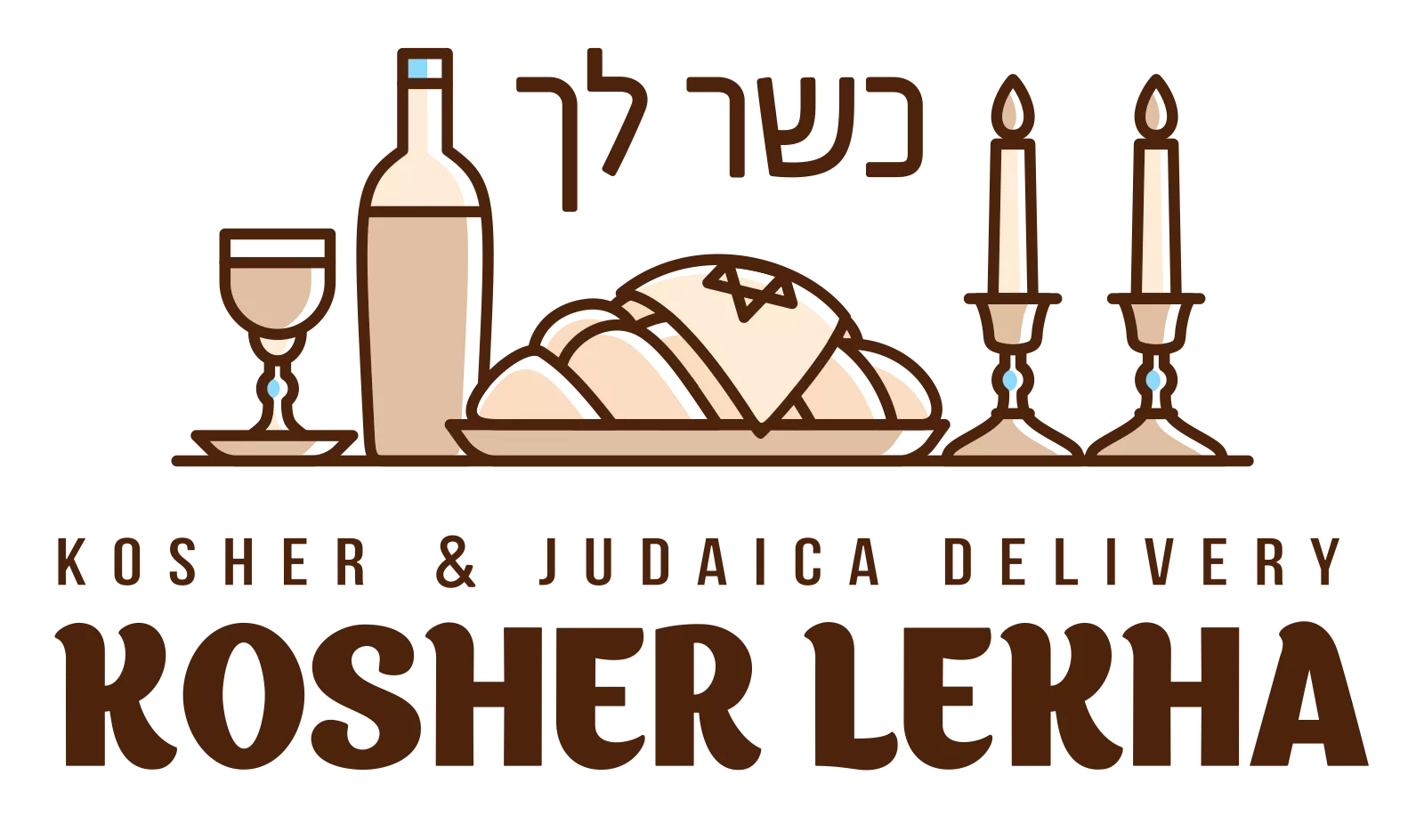About kosher food
About kosher food
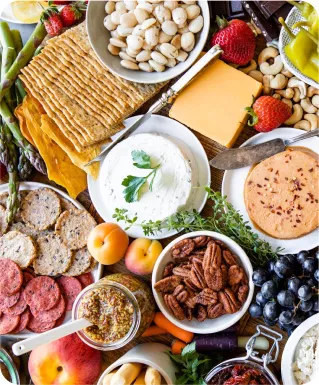
"Kosher" is one of the words that has passed from Hebrew into many world languages. People of different cultures use it in its original meaning, talking about things that correspond to generally accepted rules and standards.
In Judaism, the term "kosher" is used not only to describe food that is suitable for eating from a ritual point of view. We say that the Tefillin or the Torah scroll are kosher if they meet all the requirements of Halakha (Jewish law). This expression can also be used in relation to people. The witnesses whose testimony is accepted by the court are called "edim ksherim"; a God-fearing Jew who lives according to the Torah is said to be "adam kasher". But, of course, this word is most often used when talking about food.
In Judaism, the term "kosher" is used not only to describe food that is suitable for eating from a ritual point of view. We say that the Tefillin or the Torah scroll are kosher if they meet all the requirements of Halakha (Jewish law). This expression can also be used in relation to people. The witnesses whose testimony is accepted by the court are called "edim ksherim"; a God-fearing Jew who lives according to the Torah is said to be "adam kasher". But, of course, this word is most often used when talking about food.
Kashrut (Hebrew: כַּשְׁרוּת), in the Ashkenazi pronunciation [kashrus] is a term in Judaism that means the permissibility or suitability of something from the point of view of Halakha. In the Russian language, the adjective kosher is formed from the Hebrew word כָּשֵׁר [kasher], the Ashkenazi version of the pronunciation [kosher].
Kosher food. What is it?
Literally, "kosher" is translated as "appropriate", "suitable". To begin with, let's analyze what kashrut is. Most often, this word is used in combination with "kosher food" — this is the name of food prepared in accordance with the laws of the Jewish tradition. The totality of these laws is already called kashrut in Hebrew. It is based on a number of commandments known from the Torah, and some additional rules established later by Jewish sages.
In total, there are 365 prohibitions that affect all aspects of Jewish life, and most of these prohibitions relate to food. Thus, kashrut is a set of laws that regulate the nutrition of the Jewish people. Another important aspect in kashrut is hygiene. Products should not contain harmful substances, animals should be healthy, dairy and meat products should not only be stored separately, but also be eaten separately.
The complex variety of Jewish nutritional laws is generated by the four basic principles proclaimed by the Torah:
1. There are prohibited types of animals for food.
2. It is forbidden to eat the blood of even those types of livestock and birds whose meat is allowed.
3. It is forbidden to cook, eat and extract any benefit from a mixture of meat and dairy food.
4. There is a permitted and prohibited time for boiling and some other cooking methods.
In total, there are 365 prohibitions that affect all aspects of Jewish life, and most of these prohibitions relate to food. Thus, kashrut is a set of laws that regulate the nutrition of the Jewish people. Another important aspect in kashrut is hygiene. Products should not contain harmful substances, animals should be healthy, dairy and meat products should not only be stored separately, but also be eaten separately.
The complex variety of Jewish nutritional laws is generated by the four basic principles proclaimed by the Torah:
1. There are prohibited types of animals for food.
2. It is forbidden to eat the blood of even those types of livestock and birds whose meat is allowed.
3. It is forbidden to cook, eat and extract any benefit from a mixture of meat and dairy food.
4. There is a permitted and prohibited time for boiling and some other cooking methods.
Basic principles of kosher nutrition
It is impossible to fit all the laws of kashrut into the framework of a small text, but we can try to highlight several basic principles of kosher nutrition:
1. Some animals are prohibited for consumption (including their meat, internal organs, eggs and milk).
2. Animals that are allowed to be eaten must be slaughtered in a special way, called shechita.
3. Blood (except fish) is strictly prohibited for use in food. It should all be removed from the meat (by salting, soaking, etc.) before cooking and consuming.
4. Meat and dairy products should not be mixed or used together.
5. Dishes used for meat products should not be used for dairy products, and vice versa. Dishes used for non-kosher products are prohibited.
6. Fruits and vegetables are allowed for food, but should not contain insects and be spoiled.
7. Grape products (juice, wine, cognac) made without observing certain rules are prohibited for consumption.
Kosher food must be made from kosher products in a strictly defined way and only by Jews. All products that do not correspond to the concept of "kosher" are prohibited and harmful to the physical and spiritual health of a person. According to this, the purpose of the laws of Kashrut is to:
• reduce to a minimum the number of animals that can be killed;
• perform the killing of animals in the most painless way;
• cultivate a disgust for the shedding of blood.
Cruelty to animals is clearly prohibited by the Torah. Therefore, hunting for entertainment is also prohibited. It is necessary to kill animals only for food (it is also possible for medical research, etc.). Shechita (slaughter of livestock according to the Torah) is one of the most humane methods of killing an animal. According to the laws of Kashrut, any injured animal is no longer kosher. Thus, animals should be killed quickly with a single blow of a knife to reduce the pain to a minimum. The knife used by shochet (slaughterer) must be sharp. The animal loses consciousness in a split second. And finally, according to experts of the Torah, the purpose of the laws of Kashrut is that through eating Jews strive for holiness, so that such qualities as self-discipline and the ability to self-restraint are instilled.
1. Some animals are prohibited for consumption (including their meat, internal organs, eggs and milk).
2. Animals that are allowed to be eaten must be slaughtered in a special way, called shechita.
3. Blood (except fish) is strictly prohibited for use in food. It should all be removed from the meat (by salting, soaking, etc.) before cooking and consuming.
4. Meat and dairy products should not be mixed or used together.
5. Dishes used for meat products should not be used for dairy products, and vice versa. Dishes used for non-kosher products are prohibited.
6. Fruits and vegetables are allowed for food, but should not contain insects and be spoiled.
7. Grape products (juice, wine, cognac) made without observing certain rules are prohibited for consumption.
Kosher food must be made from kosher products in a strictly defined way and only by Jews. All products that do not correspond to the concept of "kosher" are prohibited and harmful to the physical and spiritual health of a person. According to this, the purpose of the laws of Kashrut is to:
• reduce to a minimum the number of animals that can be killed;
• perform the killing of animals in the most painless way;
• cultivate a disgust for the shedding of blood.
Cruelty to animals is clearly prohibited by the Torah. Therefore, hunting for entertainment is also prohibited. It is necessary to kill animals only for food (it is also possible for medical research, etc.). Shechita (slaughter of livestock according to the Torah) is one of the most humane methods of killing an animal. According to the laws of Kashrut, any injured animal is no longer kosher. Thus, animals should be killed quickly with a single blow of a knife to reduce the pain to a minimum. The knife used by shochet (slaughterer) must be sharp. The animal loses consciousness in a split second. And finally, according to experts of the Torah, the purpose of the laws of Kashrut is that through eating Jews strive for holiness, so that such qualities as self-discipline and the ability to self-restraint are instilled.
Types of kosher products
Kosher products that match the description of the Torah:
• Meat - beef, lamb, goat meat. It is possible to eat the meat of those animals that are artiodactyls and ruminants. Rodents (hares, rabbits, etc.) are not kosher. The slaughter of animals should occur in a special way. It is performed only by shochet (slaughterer). To remove the blood, the meat is soaked in water and sprinkled with salt, which absorbs the last drops of blood.
• Poultry - chicken, duck, geese, quails, turkey. It is forbidden to eat the meat of birds of prey and carrion birds.
• The eggs of kosher birds only are considered kosher.
• Fish - only those that have scales and fins. Red caviar is considered kosher, but black caviar is not included in this list. Eel, catfish, shark, sturgeon are not considered kosher - just like shellfish and crustaceans.
• It is possible to drink milk of kosher animals only. Another important aspect: according to the Torah, different dishes are used for cooking meat and cooking dairy products (even a different stove), meat and dairy products are stored separately (on different shelves in the refrigerator) and you can consume milk after meat only after 6 hours, but meat after milk can be consumed after 30 minutes (if we are not talking about granular cheeses, there the time is kept longer).
• Insects are prohibited. Only honey, the product of bees' vital activity, is an exception and is considered kosher. Housewives check cereals, greens and vegetables very carefully because of the ban on all types of insects.
• With regard to alcohol, the Torah prescriptions are very strict: wine must be made only by Jews.
Thus, one of the most important principles of kashrut is: "What comes from the pure is pure, and what comes from the impure is impure." It follows from this that you can not drink the milk of an impure animal, eat the eggs of an impure bird, eat the caviar of an impure fish. The only exception from this rule is honey.
• Meat - beef, lamb, goat meat. It is possible to eat the meat of those animals that are artiodactyls and ruminants. Rodents (hares, rabbits, etc.) are not kosher. The slaughter of animals should occur in a special way. It is performed only by shochet (slaughterer). To remove the blood, the meat is soaked in water and sprinkled with salt, which absorbs the last drops of blood.
• Poultry - chicken, duck, geese, quails, turkey. It is forbidden to eat the meat of birds of prey and carrion birds.
• The eggs of kosher birds only are considered kosher.
• Fish - only those that have scales and fins. Red caviar is considered kosher, but black caviar is not included in this list. Eel, catfish, shark, sturgeon are not considered kosher - just like shellfish and crustaceans.
• It is possible to drink milk of kosher animals only. Another important aspect: according to the Torah, different dishes are used for cooking meat and cooking dairy products (even a different stove), meat and dairy products are stored separately (on different shelves in the refrigerator) and you can consume milk after meat only after 6 hours, but meat after milk can be consumed after 30 minutes (if we are not talking about granular cheeses, there the time is kept longer).
• Insects are prohibited. Only honey, the product of bees' vital activity, is an exception and is considered kosher. Housewives check cereals, greens and vegetables very carefully because of the ban on all types of insects.
• With regard to alcohol, the Torah prescriptions are very strict: wine must be made only by Jews.
Thus, one of the most important principles of kashrut is: "What comes from the pure is pure, and what comes from the impure is impure." It follows from this that you can not drink the milk of an impure animal, eat the eggs of an impure bird, eat the caviar of an impure fish. The only exception from this rule is honey.
Permitted Types of Animals
The Torah says (Leviticus 11:3): "Whatever has a split hoof... and chews the cud, among the animals — that you may eat." Thus, there are two criteria for an animal to be kosher: it must both chew the cud and have split hooves. An animal is only kosher if it meets both conditions. The Torah specifically mentions four animals that meet only one of these criteria to emphasize that they are not permitted for consumption: the pig, camel, hyrax, and hare.
Most kosher animals are domesticated, but there are also wild animals that are permitted. They may be trapped, but hunting them is forbidden, as kosher slaughter (shechita) must be performed.
There are wild animals, such as the giraffe, that meet the kosher criteria, but are not eaten due to the lack of a tradition regarding their kosher slaughter.
Even if an animal is technically kosher and properly slaughtered, it may still be forbidden if it is found to be diseased during the internal inspection.
Examples of kosher animals: cow, sheep, goat, deer, elk, gazelle.
The Torah does not provide signs for kosher birds, only a list of non-kosher species — such as the eagle, owl, and pelican. Most of the forbidden birds are predators or scavengers.
Since we can’t reliably identify all of the birds listed in the Torah today, only birds with a known tradition of kosher status are consumed — including chicken, turkey, quail, duck, goose, and dove.
Halacha provides a sign for kosher eggs: they must come from kosher birds. A common (but not sufficient) sign is that one end of the egg is pointed and the other rounded. Eggs with both ends pointed or both ends rounded (usually from predatory or scavenger birds) are not kosher.
Because blood is strictly forbidden, eggs containing a blood spot in the yolk are considered treif (non-kosher). If the blood is in the egg white, it may be removed and the egg used.
Fish and seafood: Only fish that have both fins and scales are kosher. Examples include: salmon, tuna, cod, mackerel, pike, flounder, carp, herring. Fish like catfish, shark, sturgeon, beluga, swordfish, lamprey, as well as shellfish, lobsters, crabs, shrimp, and similar sea creatures are not kosher.
Most kosher animals are domesticated, but there are also wild animals that are permitted. They may be trapped, but hunting them is forbidden, as kosher slaughter (shechita) must be performed.
There are wild animals, such as the giraffe, that meet the kosher criteria, but are not eaten due to the lack of a tradition regarding their kosher slaughter.
Even if an animal is technically kosher and properly slaughtered, it may still be forbidden if it is found to be diseased during the internal inspection.
Examples of kosher animals: cow, sheep, goat, deer, elk, gazelle.
The Torah does not provide signs for kosher birds, only a list of non-kosher species — such as the eagle, owl, and pelican. Most of the forbidden birds are predators or scavengers.
Since we can’t reliably identify all of the birds listed in the Torah today, only birds with a known tradition of kosher status are consumed — including chicken, turkey, quail, duck, goose, and dove.
Halacha provides a sign for kosher eggs: they must come from kosher birds. A common (but not sufficient) sign is that one end of the egg is pointed and the other rounded. Eggs with both ends pointed or both ends rounded (usually from predatory or scavenger birds) are not kosher.
Because blood is strictly forbidden, eggs containing a blood spot in the yolk are considered treif (non-kosher). If the blood is in the egg white, it may be removed and the egg used.
Fish and seafood: Only fish that have both fins and scales are kosher. Examples include: salmon, tuna, cod, mackerel, pike, flounder, carp, herring. Fish like catfish, shark, sturgeon, beluga, swordfish, lamprey, as well as shellfish, lobsters, crabs, shrimp, and similar sea creatures are not kosher.
Forbidden Types of Animals
Reptiles, amphibians, worms, insects, and all creeping creatures are strictly forbidden on our table. (That’s why vegetables, fruits, and mushrooms must be thoroughly inspected!)
Among all sea and freshwater creatures, only those fish that have both fins and scales are permitted. Therefore, sturgeon (and its caviar), shrimp, crabs, lobsters, squid, whale meat, and similar seafood are forbidden for Jews.
The Torah lists 20 species of birds that are forbidden. Since we can’t reliably identify all of them today, tradition limits us to birds whose kosher status is beyond doubt: chickens, ducks, geese, turkeys, and doves. (Eggs of non-kosher birds are also forbidden.)
Among mammals, only those with split hooves and that chew the cud are permitted — such as goats, sheep, deer, and cows. Forbidden meats include pork, rabbit, bear, horse, and so on. (Milk from non-kosher animals is also forbidden.)
Among all sea and freshwater creatures, only those fish that have both fins and scales are permitted. Therefore, sturgeon (and its caviar), shrimp, crabs, lobsters, squid, whale meat, and similar seafood are forbidden for Jews.
The Torah lists 20 species of birds that are forbidden. Since we can’t reliably identify all of them today, tradition limits us to birds whose kosher status is beyond doubt: chickens, ducks, geese, turkeys, and doves. (Eggs of non-kosher birds are also forbidden.)
Among mammals, only those with split hooves and that chew the cud are permitted — such as goats, sheep, deer, and cows. Forbidden meats include pork, rabbit, bear, horse, and so on. (Milk from non-kosher animals is also forbidden.)
Prohibition of Blood Consumption
An animal or bird permitted for consumption may only be eaten if slaughtered by an experienced shochet (ritual slaughterer) in full accordance with all details of Jewish law. Non-kosher parts must be removed, and the meat must be soaked and salted or roasted over an open flame.
Prohibition of Mixing Meat and Dairy
The Torah forbids mixing meat and dairy products at all stages of food preparation. For this reason, a traditional Jewish home uses two separate sets of dishes: one for meat and one for dairy.
Time Factor
Time can also be a factor that renders food non-kosher. For example, chametz (leavened food) not destroyed before Passover, or food cooked on Shabbat, is considered non-kosher.
The Meaning of the Law
Almost every religious Jew has heard the question: "Do you really think G‑d cares about what we eat?" But behind this lies a deeper question: "Do you really think G‑d cares about us at all?" Many famous philosophers, from Aristotle to Hegel, believed that G‑d may care about the universe as a whole, but not about its individual parts — including humans.
However, the G‑d of Abraham, Isaac, and Jacob cares about every individual. As it is written in Psalms: “His mercy is upon all His creations.” For us, He is our Heavenly Father — and just as a father must care for a child’s moral and spiritual upbringing, he must also care about what the child eats. These things are connected.
We do not mean to say that the laws of kashrut are merely about food hygiene, although such claims have been made. It is hard to prove that keeping kosher improves health, but the Torah — divine wisdom and eternal truth — teaches us that food affects not just the body but the soul, shaping the purity and spiritual health of a Jew.
Those who have mastered the interpretation of mitzvot (commandments) have offered various explanations for the structure of kashrut. Some highlight the discipline it instills, and they are right — Torah trains a person in self-control. Others emphasize the educational aspects: Kashrut leads us to think about the value of animals and plants, encourages respect for G‑d’s creations, and fosters humility.
Some focus on the societal impact, asserting that kosher laws have preserved Jewish identity and protected against assimilation. Indeed, keeping kosher is part of living as a Jew — it defines a unique lifestyle and keeps the Jewish people distinct.
The Talmud adds another layer: the Torah refers to forbidden foods as “tamei” (impure), and the sages note its similarity to the word “timtum” — blockage. Forbidden food, they say, blocks the heart, dulling one’s spiritual sensitivity. Modern medicine also recognizes the mind-body connection, and the idea that food impacts our soul is no longer dismissed as mystical.
Rabbi Samson Raphael Hirsch, a great modern Torah commentator, explains that observance of mitzvot — including kashrut — is what enables the Jewish people to fulfill their spiritual mission with resilience, creativity, and love for G‑d.
However, the G‑d of Abraham, Isaac, and Jacob cares about every individual. As it is written in Psalms: “His mercy is upon all His creations.” For us, He is our Heavenly Father — and just as a father must care for a child’s moral and spiritual upbringing, he must also care about what the child eats. These things are connected.
We do not mean to say that the laws of kashrut are merely about food hygiene, although such claims have been made. It is hard to prove that keeping kosher improves health, but the Torah — divine wisdom and eternal truth — teaches us that food affects not just the body but the soul, shaping the purity and spiritual health of a Jew.
Those who have mastered the interpretation of mitzvot (commandments) have offered various explanations for the structure of kashrut. Some highlight the discipline it instills, and they are right — Torah trains a person in self-control. Others emphasize the educational aspects: Kashrut leads us to think about the value of animals and plants, encourages respect for G‑d’s creations, and fosters humility.
Some focus on the societal impact, asserting that kosher laws have preserved Jewish identity and protected against assimilation. Indeed, keeping kosher is part of living as a Jew — it defines a unique lifestyle and keeps the Jewish people distinct.
The Talmud adds another layer: the Torah refers to forbidden foods as “tamei” (impure), and the sages note its similarity to the word “timtum” — blockage. Forbidden food, they say, blocks the heart, dulling one’s spiritual sensitivity. Modern medicine also recognizes the mind-body connection, and the idea that food impacts our soul is no longer dismissed as mystical.
Rabbi Samson Raphael Hirsch, a great modern Torah commentator, explains that observance of mitzvot — including kashrut — is what enables the Jewish people to fulfill their spiritual mission with resilience, creativity, and love for G‑d.
Kosher Certification
Local shochtim (ritual slaughterers), bakers, and cheesemakers are a thing of the past. Today, food production has become a massive industry. Mass production and distribution on national and international markets drive increased productivity and speed, greater food variety, and more complex manufacturing processes — often influenced by the pursuit of profit.Modern food manufacturing involves a wide range of preservatives, food colorings, flavor enhancers, and additives that were unknown to the traditional home kitchen. Many of these may originate from non-kosher sources. Even the production process itself can involve small quantities of substances that seem insignificant to manufacturers but are completely unacceptable according to Jewish law. Therefore, when purchasing a product, we cannot rely solely on the list of ingredients — we must ensure that it has a reliable kosher certification. These certifications are issued by rabbinical courts (batei din) around the world, which oversee strict compliance with kosher laws by producers.
Printed according to the edition “A Guide to the World of Blessings. Blessings for Various Types of Food”, compiled by Rabbi Naftali Hoffner, Shvut Ami Publishing, 1992.
General rules of Berachot
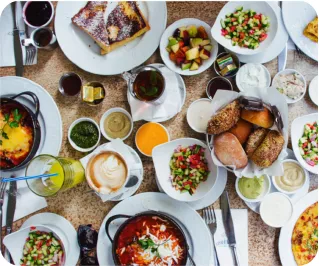
Note
In certain cases, the status of a dish is not clearly defined, and therefore there is no consensus on which blessing should be recited. In cases of doubt, you should consult your rabbi and consider his ruling as binding.This guide was compiled based on the opinion of Rabbi Naftali Hoffner (Sefer Halacha, Part 1, Laws of Blessings on Enjoyment, published by the Eliezer Hoffner Institute in Tel Aviv).
Choosing the correct Beracha
The Jewish sages established six blessings for food. Two of them apply only to specific items (Hagafen for wine, Hamotzi for bread). Three blessings refer to food categories (Ha’adama, Ha’etz, and Mezonot). Finally, the most general blessing — Shehakol — applies to essentially everything created. The specificity of a Beracha highlights the food's importance and enhances our praise to the Almighty. Therefore, it’s essential to bless food according to the sages rulings. If you are unsure which Beracha to say, recite a more general one.
Let’s clarify this with wine as an example:
Hagafen — SPECIFIC BERACHA (only for wine; "Gefen" means grapevine in Hebrew)
Ha’etz — GENERAL BERACHA (since wine is made from grapes, fruit of a tree)
Ha’adama — MORE GENERAL BERACHA (since trees grow from the ground)
Shehakol — MOST GENERAL BERACHA (used for any food if needed)
This order — from specific to general — can apply to fruits, vegetables, drinks, etc. For baked goods, the order is:
Hamotzi — SPECIFIC BERACHA (only for bread)
Mezonot — MORE GENERAL BERACHA (for food made from the five grains: wheat, barley, spelt, oats, and rye)
Shehakol — MOST GENERAL BERACHA (can be used for any food if necessary)
Let’s clarify this with wine as an example:
Hagafen — SPECIFIC BERACHA (only for wine; "Gefen" means grapevine in Hebrew)
Ha’etz — GENERAL BERACHA (since wine is made from grapes, fruit of a tree)
Ha’adama — MORE GENERAL BERACHA (since trees grow from the ground)
Shehakol — MOST GENERAL BERACHA (used for any food if needed)
This order — from specific to general — can apply to fruits, vegetables, drinks, etc. For baked goods, the order is:
Hamotzi — SPECIFIC BERACHA (only for bread)
Mezonot — MORE GENERAL BERACHA (for food made from the five grains: wheat, barley, spelt, oats, and rye)
Shehakol — MOST GENERAL BERACHA (can be used for any food if necessary)
Rules for the Ha'etz Beracha
The Ha'etz beracha is recited on appropriate fruits if the following conditions are met:
a) The fruits are ripe;
b) The part you eat is the main edible portion of the fruit, such as an orange segment, not the peel;
c) The fruits have retained their natural shape and appearance;
d) The fruits are eaten in the form they are commonly consumed (raw, cooked, etc.), or in the best possible preparation. For example, Ha'etz is said on raw nuts but not cooked ones, since it is not customary to eat cooked nuts and it is not the preferred preparation. On the other hand, Ha'etz is recited on both raw and cooked apples, as both forms are commonly eaten;
e) Fruits that are naturally bitter must be prepared in the traditional way — e.g., pickled olives;
f) The fruits must be cultivated, not wild. For example, wild walnuts require the Shehakol beracha, not Ha'etz.
a) The fruits are ripe;
b) The part you eat is the main edible portion of the fruit, such as an orange segment, not the peel;
c) The fruits have retained their natural shape and appearance;
d) The fruits are eaten in the form they are commonly consumed (raw, cooked, etc.), or in the best possible preparation. For example, Ha'etz is said on raw nuts but not cooked ones, since it is not customary to eat cooked nuts and it is not the preferred preparation. On the other hand, Ha'etz is recited on both raw and cooked apples, as both forms are commonly eaten;
e) Fruits that are naturally bitter must be prepared in the traditional way — e.g., pickled olives;
f) The fruits must be cultivated, not wild. For example, wild walnuts require the Shehakol beracha, not Ha'etz.
Rules for the Ha'adama Beracha
The Ha'adama beracha is recited on appropriate vegetables if the following conditions are met:
a) The vegetables must be recognizable (even if they have lost their original form and color, such as tomatoes used for tomato sauce);
b) The vegetables are eaten in the form commonly consumed in that location — e.g., raw (like cucumbers), cooked (like potatoes, which are usually boiled), etc.
a) The vegetables must be recognizable (even if they have lost their original form and color, such as tomatoes used for tomato sauce);
b) The vegetables are eaten in the form commonly consumed in that location — e.g., raw (like cucumbers), cooked (like potatoes, which are usually boiled), etc.
Which fruits or vegetables are eaten first
If you are about to eat several types of fruits or vegetables that require the same beracha (Ha’etz or Ha’adama), the blessing is said only once. The fruit or vegetable on which the beracha is said should be chosen according to the following rules (in order of priority):
a) If among the items are those for which the Land of Israel is praised, you bless one of them first. If there are several such items, the order is: 1) olives; 2) dates; 3) grapes; 4) figs; 5) pomegranates; 6) grains (wheat, barley, oats, rye, spelt – if cooked or baked, say Mezonot or Hamotzi).
b) A whole fruit is blessed before a cut one, even if you prefer the cut one.
c) You bless the fruit you like most.
d) You bless the fruit you most want to eat at the moment.
If you are eating fruits or vegetables where some require Ha’etz and others Ha’adama (e.g., apples and strawberries), the rules are:
a) Bless the fruit you like most – regardless of the beracha.
b) Bless the fruit you most desire to eat at the moment.
c) Bless one of the seven species praised in the Torah.
d) Bless a whole fruit, and if there isn't one – bless one that requires Ha’etz.
For store-bought fruit compote with small mixed pieces, say only one beracha (Ha’etz or Ha’adama) depending on the majority ingredient. If homemade with large fruit chunks, say a separate beracha for each fruit according to the above rules.
a) If among the items are those for which the Land of Israel is praised, you bless one of them first. If there are several such items, the order is: 1) olives; 2) dates; 3) grapes; 4) figs; 5) pomegranates; 6) grains (wheat, barley, oats, rye, spelt – if cooked or baked, say Mezonot or Hamotzi).
b) A whole fruit is blessed before a cut one, even if you prefer the cut one.
c) You bless the fruit you like most.
d) You bless the fruit you most want to eat at the moment.
If you are eating fruits or vegetables where some require Ha’etz and others Ha’adama (e.g., apples and strawberries), the rules are:
a) Bless the fruit you like most – regardless of the beracha.
b) Bless the fruit you most desire to eat at the moment.
c) Bless one of the seven species praised in the Torah.
d) Bless a whole fruit, and if there isn't one – bless one that requires Ha’etz.
For store-bought fruit compote with small mixed pieces, say only one beracha (Ha’etz or Ha’adama) depending on the majority ingredient. If homemade with large fruit chunks, say a separate beracha for each fruit according to the above rules.
If a dish contains multiple ingredients
When two types of food are eaten together and one is considered secondary to the other, the beracha is said only on the main ingredient.
For example, in a rice pudding made of rice, raisins, cinnamon, etc., rice is the main component; the others are added for flavor. Therefore, only the Mezonot blessing is said.
If a dish is composed of two ingredients, and neither can be considered secondary, then two blessings are required. The more specific blessing is said first (see above).
Examples:
Cake with coffee: since neither the coffee nor the cake is dominant, two blessings are needed. First say Mezonot and eat a piece of the cake, then say Shehakol on the coffee.
Strawberries with cream: for most people, the strawberries and cream are equally important. Therefore, first say Ha’adama on the strawberries, then Shehakol on the cream. However, if there are significantly more strawberries, the cream becomes secondary, and only Ha’adama is said. On the other hand, if the cream is clearly dominant, then only Shehakol is said.
For example, in a rice pudding made of rice, raisins, cinnamon, etc., rice is the main component; the others are added for flavor. Therefore, only the Mezonot blessing is said.
If a dish is composed of two ingredients, and neither can be considered secondary, then two blessings are required. The more specific blessing is said first (see above).
Examples:
Cake with coffee: since neither the coffee nor the cake is dominant, two blessings are needed. First say Mezonot and eat a piece of the cake, then say Shehakol on the coffee.
Strawberries with cream: for most people, the strawberries and cream are equally important. Therefore, first say Ha’adama on the strawberries, then Shehakol on the cream. However, if there are significantly more strawberries, the cream becomes secondary, and only Ha’adama is said. On the other hand, if the cream is clearly dominant, then only Shehakol is said.
Which Beracha to say on soups and juices
For juice obtained through simple squeezing (without heating) – such as orange or grapefruit juice – the beracha is Shehakol.
For juices and soups prepared by heating vegetables or fruits, the same beracha is said as on the original vegetables or fruits themselves. This is because cooking causes more flavor to transfer into the liquid than simple squeezing. Therefore, the beracha on prune juice is Ha’etz, and on tomato juice – Ha’adama.
For juices and soups prepared by heating vegetables or fruits, the same beracha is said as on the original vegetables or fruits themselves. This is because cooking causes more flavor to transfer into the liquid than simple squeezing. Therefore, the beracha on prune juice is Ha’etz, and on tomato juice – Ha’adama.
When to say Hamotzi instead of Mezonot
Before eating a dish on which the beracha Mezonot is usually said, you must decide how much you intend to eat.
a) If the portion does not exceed the volume of three to four eggs (according to Rabbi Moshe Feinstein, about 170 grams), you say Mezonot.
b) If you plan to eat more than that amount, the food is considered as bread — even if it doesn't look like regular bread. Therefore, you must act as if you’re eating bread: wash your hands before the meal, recite the Hamotzi blessing, and say Birkat Hamazon afterward.
c) Similarly, if a Mezonot food is eaten at the beginning of a full meal — even in small quantity — you must wash hands, say Hamotzi before eating, and Birkat Hamazon after.
d) The best way to avoid uncertainty is to begin the meal with bread.
a) If the portion does not exceed the volume of three to four eggs (according to Rabbi Moshe Feinstein, about 170 grams), you say Mezonot.
b) If you plan to eat more than that amount, the food is considered as bread — even if it doesn't look like regular bread. Therefore, you must act as if you’re eating bread: wash your hands before the meal, recite the Hamotzi blessing, and say Birkat Hamazon afterward.
c) Similarly, if a Mezonot food is eaten at the beginning of a full meal — even in small quantity — you must wash hands, say Hamotzi before eating, and Birkat Hamazon after.
d) The best way to avoid uncertainty is to begin the meal with bread.
Additional Berachot said during a meal
After saying Hamotzi on bread at the beginning of the meal, other blessings over foods eaten during that meal are generally not required, except for the following:
a) Wine, which requires the blessing Hagafen (unless some wine was already drunk before the meal, for example during Kiddush).
b) Fruits that are eaten separately, such as for dessert.
There is no need to say Al Hamichya or Borei Nefashot after the wine or fruits, since Birkat HaMazon covers them as well.
a) Wine, which requires the blessing Hagafen (unless some wine was already drunk before the meal, for example during Kiddush).
b) Fruits that are eaten separately, such as for dessert.
There is no need to say Al Hamichya or Borei Nefashot after the wine or fruits, since Birkat HaMazon covers them as well.
Birkat HaMazon – blessing after a meal
After the meal is finished, one should recite Birkat HaMazon as soon as possible. If it was not said immediately, it may still be said within 72 minutes after the end of the meal. If more than 72 minutes have passed (or you are unsure of the time) and you are hungry again, you do not recite Birkat HaMazon. However, if you are not yet hungry, you should eat at least a kezayit (approximately half an egg in volume, but not less than a third of an egg) of any food to ensure you are still obligated to recite Birkat HaMazon, and then say the blessing.
If Birkat HaMazon is recited outside the home, such as on a plane, train, etc., one should replace the words:
Harachaman hu yishlach lanu beracha meruba babayit hazeh (May the Merciful One send abundant blessing upon this home)
with:
Harachaman hu yishlach lanu beracha meruba b’halichoteinu uv’shivoteinu ad olam (May the Merciful One send us abundant blessing in our travels and in our dwellings forever).
If Birkat HaMazon is recited outside the home, such as on a plane, train, etc., one should replace the words:
Harachaman hu yishlach lanu beracha meruba babayit hazeh (May the Merciful One send abundant blessing upon this home)
with:
Harachaman hu yishlach lanu beracha meruba b’halichoteinu uv’shivoteinu ad olam (May the Merciful One send us abundant blessing in our travels and in our dwellings forever).
Al HaMichyah – blessing after a meal without bread
This blessing is recited after wine, or after one of the five fruits for which the Land of Israel is praised (olives, dates, grapes, figs, or pomegranates), or after baked goods (excluding bread) made from flour of one of the five species of grain (wheat, barley, oats, rye, and spelt).
If you do not remember this blessing by heart, you may say the shorter blessing Al Nefashot, which is used when neither Birkat HaMazon nor Al HaMichyah is required. However, if you are certain that you will be able to reach a place within 72 minutes where you can read the blessing from a Siddur (prayer book), then you are obligated to do so.
If you do not remember this blessing by heart, you may say the shorter blessing Al Nefashot, which is used when neither Birkat HaMazon nor Al HaMichyah is required. However, if you are certain that you will be able to reach a place within 72 minutes where you can read the blessing from a Siddur (prayer book), then you are obligated to do so.
Taking Medicine
No blessing is required either before or after taking medicine if it is swallowed with water. However, if the medicine is taken with another beverage, such as orange juice, the appropriate blessing for that drink should be recited (in this case, Shehakol).
Rules for the Beracha Shehecheyanu
Shehecheyanu is recited when eating a fruit or vegetable for the first time in its season. The following conditions must be met:
a) The fruit or vegetable ripens only once or twice a year, but not more often.
b) The fruit must be absolutely fresh. Shehecheyanu is not recited for potatoes stored in a cellar, mushrooms, or vegetables that are never considered the main part of a meal (such as lettuce).
c) The fruit must be fully ripe and ready to eat.
Shehecheyanu may be recited on all varieties of the same fruit, such as light and dark dates, or black and red currants.
The Shehecheyanu blessing is recited before the Ha'etz or Ha'adama blessing. If you mistakenly said Ha'etz or Ha'adama first, you may still say Shehecheyanu afterward, before eating the fruit. Once the fruit has been fully eaten, Shehecheyanu can no longer be said.
a) The fruit or vegetable ripens only once or twice a year, but not more often.
b) The fruit must be absolutely fresh. Shehecheyanu is not recited for potatoes stored in a cellar, mushrooms, or vegetables that are never considered the main part of a meal (such as lettuce).
c) The fruit must be fully ripe and ready to eat.
Shehecheyanu may be recited on all varieties of the same fruit, such as light and dark dates, or black and red currants.
The Shehecheyanu blessing is recited before the Ha'etz or Ha'adama blessing. If you mistakenly said Ha'etz or Ha'adama first, you may still say Shehecheyanu afterward, before eating the fruit. Once the fruit has been fully eaten, Shehecheyanu can no longer be said.
Printed according to the edition “A Guide to the World of Blessings. Blessings for Various Types of Food”, compiled by Rabbi Naftali Hoffner, Shvut Ami Publishing, 1992.
Other Rules for Using Blessings
1. Before eating bread, wash hands (pour twice on the right hand and twice on the left) and say: "Baruch Atah Adonai Eloheinu Melech HaOlam, Asher Kid’shanu B’mitzvotav V’tzivanu Al Netilat Yadayim." (Blessed are You, Lord our God, King of the universe, who sanctified us with His commandments and commanded us regarding the washing of the hands).2. Before eating bread: "Baruch Atah Adonai Eloheinu Melech HaOlam, HaMotzi Lechem Min Ha'aretz." (Blessed are You, Lord our God, King of the universe, who brings forth bread from the earth).
3. Before eating food made from wheat, barley, rye, oats, or spelt (and according to some, also rice), excluding bread: "Baruch Atah Adonai Eloheinu Melech HaOlam, Borei Minei Mezonot." (…Who creates various kinds of sustenance).
4. Before drinking wine or grape juice: "Baruch Atah Adonai Eloheinu Melech HaOlam, Borei Pri HaGafen." (…Who creates the fruit of the vine).
5. Before eating fruits that grow on trees (e.g., cherries): "Baruch Atah Adonai Eloheinu Melech HaOlam, Borei Pri HaEtz." (…Who creates the fruit of the tree).
6. Before eating produce from the ground (vegetables, pineapples, and also bananas): "Baruch Atah Adonai Eloheinu Melech HaOlam, Borei Pri HaAdamah." (…Who creates the fruit of the ground).
7. Before eating other types of food or drinking other beverages (meat, fish, eggs, dairy, water, etc.): "Baruch Atah Adonai Eloheinu Melech HaOlam, Shehakol Nih’yeh Bidvaro." (Blessed are You, Lord our God, King of the universe, by Whose word everything came to be).
The Berachot

The Beracha «HaMotzi» is pronounced for bread, challah, bagels, matzot, pita and other products from 5 types of cereals - wheat, rye, oats, spelt, barley, which are made like bread, i.e. with the addition of water.
The text of the blessing:
:בָּרוּךְ אַתָּה יְיָ אֱלֹהֵינוּ מֶלֶךְ הָעוֹלָם הַמּוֹצִיא לֶחֶם מִן הָאָרֶץ
Transliteration:
Barukh ata Adonai Eloheinu, melekh ha'olam, hamotzi lehem min ha'aretz.
Translation into English:
Blessed are You, LORD our G-d, King of the universe, Who brings forth bread from the earth.

The Beracha «M'zonot» - a more general blessing (compared to HaMotzi), is pronounced for baked goods (except bread) and porridge from five types of cereals, as well as for other food made from flour of five types of cereals – wheat, barley, spelt, oats and rye (according to many, also from rice). This blessing is pronounced on cakes, cookies, cupcakes, donuts, pasta, as well as bagels, pitas and other products, if they are prepared like a m'zonot, i.e. without adding water (for example, on juice).
The text of the blessing:
:בָּרוּךְ אַתָּה יְיָ אֱלֹהֵינוּ מֶלֶךְ הָעוֹלָם בּוֹרֵא מִינֵי מְזוֹנוֹת
Transliteration:
Barukh ata Adonai Eloheinu, Melekh ha'olam, bo're minei m'zonot.
Translation into English:
Blessed are You, LORD our G-d, King of the universe, Who creates varieties of nourishment.
When to say Hamotzi instead of Mezonot:
Before eating a dish on which the beracha Mezonot is usually said, you must decide how much you intend to eat.
a) If the portion does not exceed the volume of three to four eggs (according to Rabbi Moshe Feinstein, about 170 grams), you say Mezonot.
b) If you plan to eat more than that amount, the food is considered as bread — even if it doesn't look like regular bread. Therefore, you must act as if you’re eating bread: wash your hands before the meal, recite the Hamotzi blessing, and say Birkat Hamazon afterward.
c) Similarly, if a Mezonot food is eaten at the beginning of a full meal — even in small quantity — you must wash hands, say Hamotzi before eating, and Birkat Hamazon after.
d) The best way to avoid uncertainty is to begin the meal with bread.
Before eating a dish on which the beracha Mezonot is usually said, you must decide how much you intend to eat.
a) If the portion does not exceed the volume of three to four eggs (according to Rabbi Moshe Feinstein, about 170 grams), you say Mezonot.
b) If you plan to eat more than that amount, the food is considered as bread — even if it doesn't look like regular bread. Therefore, you must act as if you’re eating bread: wash your hands before the meal, recite the Hamotzi blessing, and say Birkat Hamazon afterward.
c) Similarly, if a Mezonot food is eaten at the beginning of a full meal — even in small quantity — you must wash hands, say Hamotzi before eating, and Birkat Hamazon after.
d) The best way to avoid uncertainty is to begin the meal with bread.

The Beracha «HaGefen» is pronounced only on wine made from grapes, or grape juice. Not said for any other drink or any other grape-based product. The Hebrew word «Gefen» means «The grapevine».
The text of the blessing:
:בָּרוּךְ אַתָּה יְיָ אֱלהֵינוּ מֶלֶךְ הָעולָם בּוֹרֵא פְּרִי הַגָּפֶן
Transliteration:
Barukh ata Adonai Eloheinu, Melekh ha'olam, bo're p'ri hagefen.
Translation into English:
Blessed are You, LORD our G-d, King of the universe, Who creates the fruit of the vine.
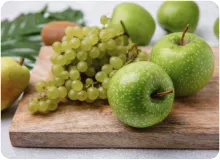
The Beracha «HaEtz» is pronounced on all fruits of fruit trees, including grapes, dried fruits and nuts (except bananas, pineapples and groundnuts). The Hebrew word «Etz» means «Tree».
The text of the blessing:
:בָּרוּךְ אַתָּה יְיָ אֱלהֵינוּ מֶלֶךְ הָעולָם בּוֹרֵא פְּרִי הָעֵץ
Transliteration:
Barukh ata Adonai Eloheinu, Melekh ha'olam, bo're p'ri ha'etz.
Translation into English:
Blessed are You, LORD our G-d, King of the universe, Who creates the fruit of the tree.
Rules for the Ha'etz Beracha:
The Ha'etz beracha is recited on appropriate fruits if the following conditions are met:
a) The fruits are ripe;
b) The part you eat is the main edible portion of the fruit, such as an orange segment, not the peel;
c) The fruits have retained their natural shape and appearance;
d) The fruits are eaten in the form they are commonly consumed (raw, cooked, etc.), or in the best possible preparation. For example, Ha'etz is said on raw nuts but not cooked ones, since it is not customary to eat cooked nuts and it is not the preferred preparation. On the other hand, Ha'etz is recited on both raw and cooked apples, as both forms are commonly eaten;
e) Fruits that are naturally bitter must be prepared in the traditional way — e.g., pickled olives;
f) The fruits must be cultivated, not wild. For example, wild walnuts require the Shehakol beracha, not Ha'etz.
The Ha'etz beracha is recited on appropriate fruits if the following conditions are met:
a) The fruits are ripe;
b) The part you eat is the main edible portion of the fruit, such as an orange segment, not the peel;
c) The fruits have retained their natural shape and appearance;
d) The fruits are eaten in the form they are commonly consumed (raw, cooked, etc.), or in the best possible preparation. For example, Ha'etz is said on raw nuts but not cooked ones, since it is not customary to eat cooked nuts and it is not the preferred preparation. On the other hand, Ha'etz is recited on both raw and cooked apples, as both forms are commonly eaten;
e) Fruits that are naturally bitter must be prepared in the traditional way — e.g., pickled olives;
f) The fruits must be cultivated, not wild. For example, wild walnuts require the Shehakol beracha, not Ha'etz.

The Beracha «HaAdama» is pronounced on the fruits of the land - all vegetables and herbs, groundnuts, bananas, melons, watermelons, pineapples, as well as on the fruits of low trees - cranberries, strawberries, raspberries and some others. The Hebrew word «Adama» means «earth» or «soil».
The text of the blessing:
:בָּרוּךְ אַתָּה יְיָ אֱלֹהֵינוּ מֶלֶךְ הָעוֹלָם בּוֹרֵא פְּרִי הָאֲדָמָה
Transliteration:
Barukh ata Adonai Eloheinu, Melekh ha'olam, bo're p'ri ha'adama.
Translation into English:
Blessed are You, LORD our G-d, King of the universe, Who creates the fruit of the ground.
Rules for the Ha'adama Beracha:
The Ha'adama beracha is recited on appropriate vegetables if the following conditions are met:
a) The vegetables must be recognizable (even if they have lost their original form and color, such as tomatoes used for tomato sauce);
b) The vegetables are eaten in the form commonly consumed in that location — e.g., raw (like cucumbers), cooked (like potatoes, which are usually boiled), etc.
The Ha'adama beracha is recited on appropriate vegetables if the following conditions are met:
a) The vegetables must be recognizable (even if they have lost their original form and color, such as tomatoes used for tomato sauce);
b) The vegetables are eaten in the form commonly consumed in that location — e.g., raw (like cucumbers), cooked (like potatoes, which are usually boiled), etc.
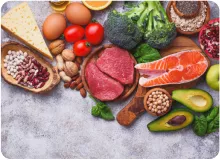
The Beracha «SheHaKol» is pronounced for types of food that are not made of flour and are neither the fruits of the tree nor the fruits of the earth. This is the most common bracha, which, if necessary, refers to any food. Thus, for meat, fish, eggs, mushrooms, sweets, various dairy products and juices (with the exception of grape) – they say the blessing «SheHaKol». This Beracha applies to any products not included in other categories, as well as to a mixture of products of different categories. The Hebrew word «HaKol» means «Everything».
The text of the blessing:
:בָּרוּךְ אַתָּה יְיָ אֱלהֵינוּ מֶלֶךְ הָעוֹלָם שֶׁהַכֹּל נִהְיָה בִּדְבָרוֹ
Transliteration:
Barukh ata Adonai Eloheinu, Melekh ha'olam, shehakol nih'ye bidvaro.
Translation into English:
Blessed are You, LORD our G-d, King of the universe, through Whose word everything comes into being.
